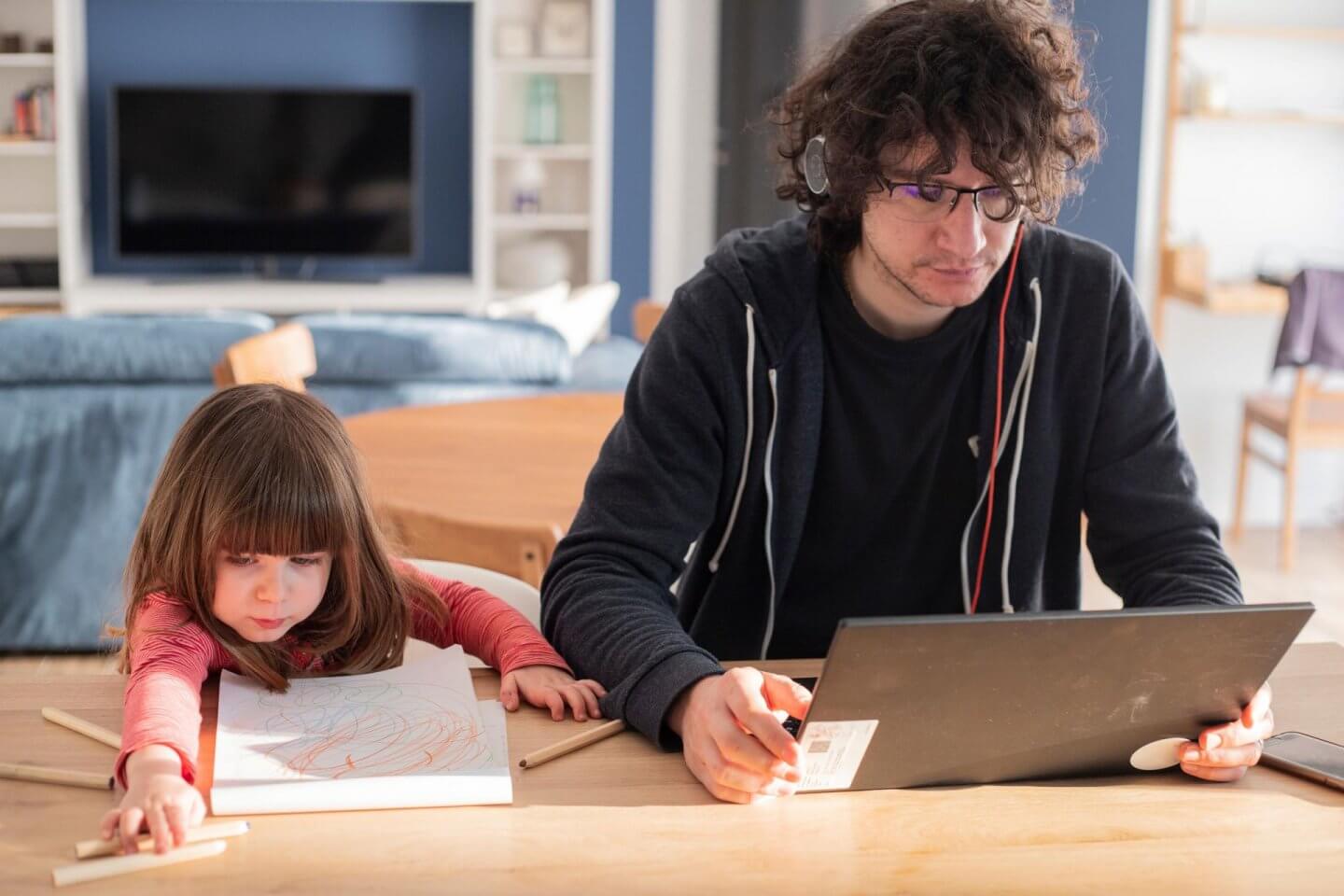Lockdown Fathers & Time with Dad: Learning from the pandemic
What can we learn from pandemic? What positives can we take away from it? I’ll tell you: According to new research from the fatherhood Institute, dads what increased opportunities to work flexibly and from home. The research shows men have learned from the experiences of the past 15 or so months and do not want to turn the clock back. They want to take on more childcare and responsibilities and remove some of the domestic burden from women.

Something I’ve long said is that the pandemic has provided an opportunity to improve gender equality. Dads have spent a lot of time at home and despite some negative headlines and poorly-thought out commentary, there is no question many have been more involved with family life than ever before.
Men are reporting they have developed better relationships with their children because of time spent at home during the pandemic. Dads are saying they feel better placed to support their children’s education and they have spent more time on household tasks.
Crucially, fathers are explicitly saying they want to work flexibly in future. They want more options to work from home in order to continue being better fathers.
Should anyone be surprised?
For someone like myself, none of this comes as a surprise. It’s what I have been hearing from dads throughout the pandemic. Nonetheless, the Fatherhood Institute’s research, called Lockdown Fathers: The Untold Story is vitally important because it focuses on the impact on men and dads.
Producing a report is one thing. What needs to follow is action and so the Fatherhood Institute is also launching a campaign called Time With Dad (#TimeWithDad). The aim is to connect with employers, schools and parents and ‘build back’ from the pandemic in ways that will recognise and appreciate men’s responsibilities as caregivers.
Impact of the pandemic on women
In the interests of equality, it has to be stressed there is masses of research and data showing that much of the domestic burden has fallen on women since March 2020. Women have been more likely to lose their job or be furloughed. Some research has also shown that managers did more to keep in touch with male employees working from home, a clear sign that employers put more value on men’s labour.
There is also a line of thought that women could experience a longer-term, negative impact as a result of the pandemic. As women are more likely to work flexibly or part time, there is a possibility women will continue to work remotely whereas men will be expected to be present in the workplace. If this happened, workplaces could become predominantly or exclusively male environments and that would be a dreadful outcome taking the world back 40 or 50 years.
Highlights from the Lockdown Fathers report
Lockdown Fathers: The Untold Story, was carried out with 2,000 men. Backing the research was the fatherhood Institute, plus the Nuffield Foundation and Britain Thinks. What makes it stand out is that it focuses solely on dads.
The study found that:
- 78% of partnered dads spent more time with their children
- 68% of partnered dads spent time on remote schooling and homework and 58% spent more time on cleaning, laundry and cooking
- 61% of partnered fathers reported having a better understanding of their children. Around 3%, meanwhile, reported closeness and understanding deteriorating
- Black, Asian and mixed-heritage fathers reported feeling even closer to their children (71%) compared white fathers (61%).
The full report can be found here on the Fatherhood Institute website. It’s worth taking a look at as it goes much further than these highlights and explores the impact on separated fathers as well as considering other issues affecting dads.
Time With Dad
A sparkly new report is one thing. It’s the #TimeWithDad campaign that will hopefully lead to real change.
Change will be required to cement in the positive impacts of lockdown and ensure men take on more of the childcare responsibility and domestic burden from women.

Adrienne Burgess, Co-Chief Executive of the Fatherhood Institute said: “During lockdowns, fathers grew in confidence and competence, providing much more childcare and educational support. Post-pandemic, government, employers and trades unions should help them retain gains in home and flexible working, and schools should enlist dads to help in the huge educational ‘catch-up’ programme. Through our ‘Time with Dad’ campaign, we are building a space to develop new and innovative solutions.”
The Fatherhood Institute is calling on employers and schools to take the following steps:
- Employer human resources policies should support fathers’ desire to work more flexibly and/or work from home. They should take account of men’s caregiving commitments (including sharing care of children with former partners) and men’s longer average commuting times, when developing and communicating about work plans and shift schedules.
- The forthcoming Employment Bill should create a duty on employers to advertise vacancies flexibly wherever possible and to detail flexibility options.
- Trades unions and professional bodies should help fathers negotiate reasonable, family-friendly work patterns.
- Schools and early years education providers should work to communicate with and mobilise dads to help with post-pandemic ‘catch-up’ learning, building on what fathers did during the lockdowns.
What’s been your experience?
Time With dad launches today and anyone with an interest, be they a dad, an employer, working in education etc. can sign up and kept informed (follow this link). You can also keep an eye out on social media for the #TimeWithdad hashtag.
The vital question is whether you can relate to the findings in the Lockdown Fathers report? If you are a mum, do you think your spouse or partner did more during lockdown and would you like this to continue? If you are a dad, how important will it be for you to work flexibly in future?
I think the timing of this campaign is vital. Employers are beginning to think about welcoming staff back to the workplace. Lockdown Fathers is further evidence they’ll need to seriously think about flexible, hybrid working if they’re going to retain both male and female talent and also make the workplace and home more equitable for both women and men.







3 thoughts on “Lockdown Fathers and Time with Dad: Learning From the Pandemic”
Interesting article and I so badly wish that it applied to our family. Unfortunately we saw even less of my husband during the pandemic, because the moment he was labelled a keyworker he decided that he must work 7 days per week throughout the lockdowns. He is only supposed to work Mon-Fri, he is entitled to annual leave, and yet he is married to his job. This goes deeper than gender inequality. He has a serious mental health condition and I have nowhere to turn for help because he is in denial. It broke our family.
Thanks for sharing your experiences and sorry to hear they have not been positive. I also hope you as a family are able to get the support you need with this situation. This particular research took a more generalist view and for many families the long term implications of lockdown could be positive (or it could have positive elements). that isn’t to say that some familes, such as your own, were not negatively impacted and this has to be recognised.
Thanks for the article. We had our first child late 2020 so working from home meant I was there for the whole pregnancy, great since we’re firm believers in equal parenting. However, I fear that exclusion from the medical journey (which was tough) will leave many fathers detached. I hope flexible working will provide an opportunity and motivation for them to get involved again. I also hope policies consider new family demographics which I’m guessing are often like ours – young (ish) city-dwellers with limited space at home. If we’re going to see lasting change, we need to get our laptops away from the kitchen table. This means giving us the confidence to move further from the office without fearing a return to presenteeism and an unsustainable daily commute.
As for us? Had it not been for the lockdowns, we wouldn’t have taken so much shared parental leave and I doubt I’d currently be planning to go back part-time!